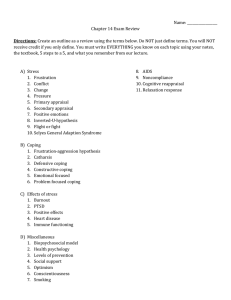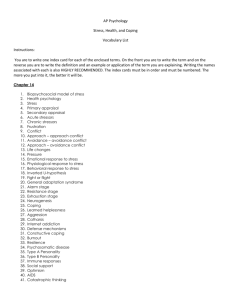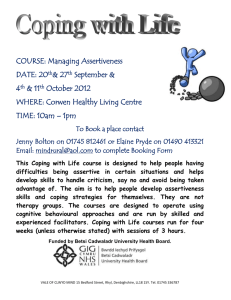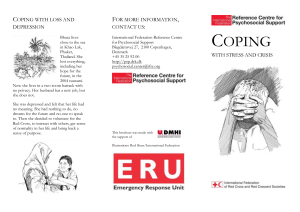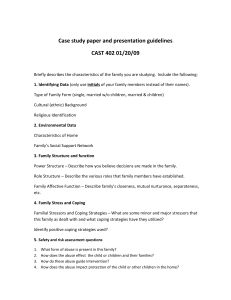Melissa Soward, BA Alysha M. Stucker, BA
advertisement
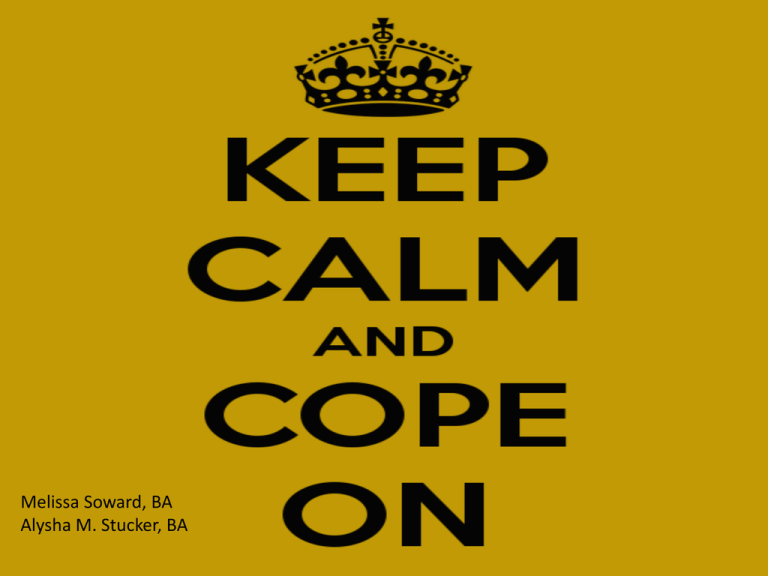
Melissa Soward, BA Alysha M. Stucker, BA Objectives o Understand that coping is an active effort to manage stress. o Acquire knowledge about multiple coping strategies to handle common stressors. o Understand personal strengths in relationship to coping by voicing strengths. o Practice one new strategy today. What is “Coping?” In psychology, coping is expending conscious effort to solve personal and interpersonal problems, and seeking to master, minimize or tolerate stress or conflict. The effectiveness of the coping efforts depend on the type of stress and/or conflict, the particular individual, and the circumstances Stressors: 85% of college students in 2009 say they feel stress in their daily lives. 69% of college campuses provide stress reduction programs. (as reported by 293 college counseling centers surveyed) Contributing Factors to Stress According to College Students: Family Issues/ Relationships/Dating 54% Family Issues 53% Relationships/ Dating Physical/Emotional/ Mental Health 35% Physical Health 31% Mental Health Academics 74% Grades 78 % School work Concern for Future 47% Finding a job 38% Getting into graduate school COPE! o Remember, everyone First, try to has stress understand o Asses the problem and what it is think critically that’s o Prioritize what’s impacting you. important o Break your plan into smaller steps o Get support What do you bring? o Your personal qualities and strengths impact how you overcome difficulties. o How have you overcome difficulties before? What has already worked? o Do you assign personal meaning to successes and failures? o Confidence in ability to “figure it out” not to “be perfect.” Speaking of Strengths How do your qualities play into your ability to handle stressors? http://www.viacharacter.org/www/TheSurvey Keep Calm and Feel Better Don’t stress about stress! What’s Necessary? 1. Sleep 2. Food 3. Exercise What can make it even better? 1. Make time to socialize! 2. Fun! 3. Quiet time 4. Keep a gratitude journal. Nurture & Self-care Gratitude Journal What quality about yourself are you grateful for? What’s going well in your life that you are glad about? References Weiten, W. & Lloyd, M.A. (2008) Psychology Applied to Modern Life (9th ed.). Wadsworth Cengage Learning. Snyder, C.R. (ed.) (1999) Coping: The Psychology of What Works. New York: Oxford University Press. Zeidner, M. & Endler, N.S. (editors) (1996) Handbook of Coping: Theory, Research, Applications. New York: John Wiley. Cummings, E. Mark; Greene, Anita L.; Karra ker, Katherine H., eds. (1991). Life-span Developmental Psychology: Perspectives on Stress and Coping. R. S. Lazarus & S. Folkman, Stress, Appraisal, and Coping (1984) p.141 http://www.heartbridgeusa.com/devo/wpcontent/uploads/2010/12/2008_personality_test1.pdf CollegeDegreeSearch.net
